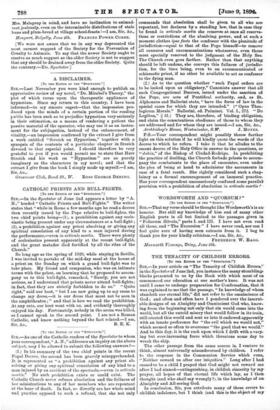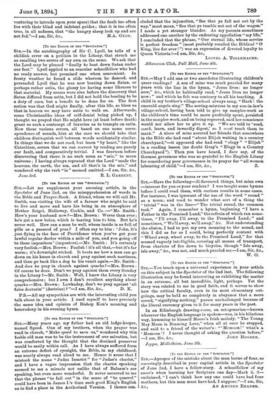THE TENACITY OF CHILDISH ERRORS.
ITo TEE EDITOR OF THE "SPECTATOR."] SIR,—In your article on "The Tenacity of Childish Errors," in the Spectator of June 2nd, you instance the many stumbling. blocks presented to us by the Book with which most of us commenced our education at our mother's knee. It was not until I came to undergo preparation for Confirmation, that it was explained to me that the passage, "In knowledge of whom standeth our eternal life," did not refer to the omniscience of God ; and often and often have I pondered over the inscrut- able designs of an Almighty and Omniscient God who, know- ing from the beginning not only that sin would come into the world, but all the untold misery that would follow in its train,_ still created this world and sent us into it endowed apparently with an innate preference for "the evil which we would not,' which seemed so often to overcome "the good that we would." And to this day, it is the rock upon which I drift with a vary, ing but ever-increasing force which threatens some day to wreck the ship.
The other passage from the same source is, I venture to think, almost universally misunderstood by children. I refer to the response in the Communion Service which runs, "Neither reward us after our iniquities." Long after I had ceased to be a child I prayed that God might not reward me after I had sinned—extinguishing, in childish sincerity by my prayer, all hopes of that eternal life which lay, as I then. thought (and who shall say wrongly ?), in the knowledge of an Almighty and All-seeing God.
In conclusion, Sir, you attribute many of these errors to childish indolence, but I think (and this is the object of my
venturing to intrude upon your space) that the fault too often lies with their blind and indolent guides ; that it is too often true, in all sadness, that "the hungry sheep look up and are







































 Previous page
Previous page